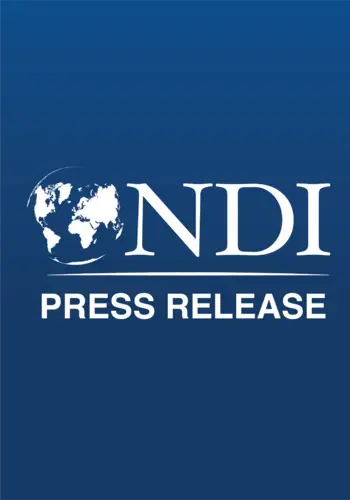Tbilisi: Diana Chachua , [email protected], +995 577 77 96 39
Washington, DC: Jerry Hartz, [email protected], +1 202 728 5500

Resources
TBILISI – Poll results released today by the National Democratic Institute (NDI) and CRRC Georgia show growing dissatisfaction about the state of the country’s economy, environment, and political climate going into the presidential election. 62 percent of citizens believe the country is going in the wrong direction compared to only 29 percent saying the right direction. Compared to 10 years ago, Georgians see improvement in freedom of speech, affordable healthcare, and rights of women and minorities. However, they see a worsening picture with regard to corruption, court system, jobs, crime, poverty, territorial integrity and rising prices. Top issues remain economic ones – employment, poverty, and prices – and only 3 percent assess the economy as “good.” Further, 59 percent of respondents report that they have not worked a day in the last month.
Georgians would like to see healthcare, education, pensions, and social assistance as top spending priorities and would tolerate cuts in foreign affairs, police, sports, and assistance to small and medium businesses to accommodate.
“Despite reported growth, for most Georgians the country’s economic outlook is bleak. This growth has not trickled down,” said Laura Thornton, senior country director. “Policymakers will need to translate the country’s growth figures into concrete improvements for the general public, higher employment and better economic outcomes, and prioritize providing solutions to citizens’ concerns about healthcare and education.”
The majority of Georgians also assesses the quality of the environment as a significant problem, particularly in Tbilisi, and up to 90 percent support a wide range of measures from technical inspections on cars, mandatory recycling, and regular testing of food products to banning plastic bags and containers, and improving public transport.
With a presidential election approaching, citizens are looking to hear candidates talk more about employment, healthcare, and education and do not want discourse about past governments, personal attacks, or criticisms of other parties. When asked if they were decided about their vote if presidential elections were held tomorrow, 74 percent of respondents reported that they were undecided, the highest figure seen in NDI’s polls to date. Further, few could identify a party closest to them ideologically, with
18 percent choosing ruling party Georgian Dream (GD), 10 percent United National Movement (UNM), and 3 percent Labor Party. All other parties polled below 3 percent.
With an election date yet to be called and uncertainty about the field of candidates, who runs could change the nature and discourse of the election. If President Margvelashvili participates, a GD candidate would receive 12 percent, UNM candidate 10 percent, the current president and David Bakradze, European Georgia’s candidate, would both receive 6 percent, and Shalva Natelashvili, Labor Party candidate, 4 percent. However, if the president does not compete, the GD candidate’s numbers rise to 17 percent, while others remain statistically the same. Interestingly, in different second round scenarios, GD earns around 32 percent against a UNM candidate (20 percent), Bakradze (20 percent), Patriot’s Alliance candidate (11 percent), or Natelashvili (18 percent). However, in a runoff against the incumbent president, a GD candidate gets only 26 percent and the president 21 percent, indicating a closer race compared to the other candidates. A majority believes the opposition should unite around a single candidate, and a plurality believe an opposition-aligned president would be better for the country.
“Given the perceptions about the country’s direction and the economy, it is not surprising that many citizens are unsatisfied with their political choices and are undecided about how to vote,” said Thornton. “This undecided rate applies to the upcoming presidential election, and may be exacerbated by lack of certainty about potential candidates, though the poll indicates that President Margvelashvili’s participation might influence the competitiveness of the race.”
NDI surveys public opinion to help Georgian stakeholders diagnose and address issues of public concern by providing accurate, unbiased and statistically-sound data. This poll aims to capture the most relevant information to foster the development of responsive policies and governance. A wide range of leaders from across the political spectrum have reported that the polls are important to their work and encourage continued polling. The results reflect data collected from June 23 to July 8 through face-to-face interviews with a nationwide representative sample of Georgia’s adult population, excluding occupied territories, that included 2,409 completed interviews. The average margin of error is +/- 1.9 percent.
NDI’s survey work is funded with UK aid from the British people.
This poll was carried out by CRRC Georgia.
###
NDI is an independent, nonprofit, nonpartisan organization working to support and strengthen democratic institutions worldwide through citizen participation, openness and accountability in government. More information is available at www.ndi.org.
CRRC-Georgia is a non-governmental, non-profit research organization with a mission to promote evidence-based debates on policy issues by providing reliable, up-to-date and accessible data and analysis. More information is available at http://www.crrc.ge